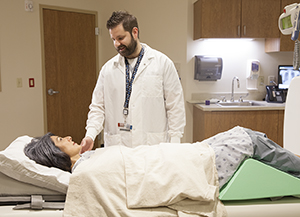Intravenous Pyelogram (IVP)
Intravenous Pyelogram (IVP)

How do I prepare for an IVP?
-
Follow all instructions on what to eat and drink before the test.
-
If instructed, take a laxative the night before your IVP.
-
Allergies, especially to iodinated intravenous (IV) contrast (a substance that improves X-ray images). You can still have an IVP if you are allergic to the contrast substance, but you will need to take a medicine beforehand.
-
Previous kidney or bladder problems.
-
Diabetes medicine you take.
-
Any previous surgery.
-
If you are or may be pregnant.
What are the risks of an IVP?
Risks associated with IVP include:
-
Radiation exposure
-
Reaction to the contrast substance, which may be mild (itching, hives, nausea) or severe (difficulty breathing, swelling of the throat, drop in blood pressure)
-
Worsening of kidney damage
What happens during an IVP?
-
Your healthcare provider will give you an intravenous (IV) injection of contrast.
-
You’ll be asked to move from side to side and then hold still as X-rays are taken.
-
Your healthcare provider may apply pressure to your belly to help get the best images.
-
You may be asked to empty your bladder before the final X-ray.
Your test results
Your doctor will discuss the test results with you during a follow-up visit or over the phone.
Your next appointment is: _________________
Updated:
March 15, 2019
Sources:
McDonald, JS. Frequency of Acute Kidney Injury Following Intravenous Contrast Medium Administration: A Systematic Review and Meta Analysis
Reviewed By:
Brown, Kim, APRN,Sudheendra, Deepak, MD